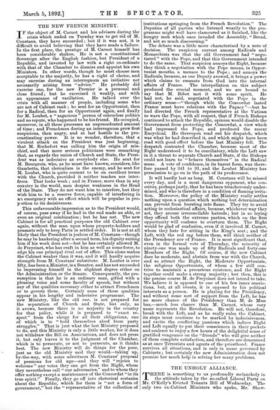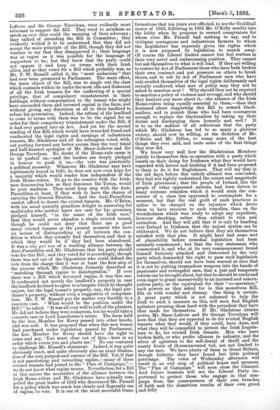THE UNHOLY ALLIANCE.
rr HERE is something to us profoundly melancholy in _L the attitude taken by the so-called Liberal Party on Mr. O'Kelly's Evicted Tenants Bill of Wednesday. The only two ex-Cabinet Ministers who spoke, Mr. Shaw- Lefevre and Sir George Trevelyan, were evidently most reluctant to support the Bill. They tried to minimise as much as ever they could the meaning of their advocacy ; they talked of amending the Bill in Committee ; they evidently wished it to be understood that they did not accept the main principle of the Bill, though they did not venture to say that they disapproved it ; their language was as vague as it was possible for the language of supporters to be; but they knew that the party could not oppose it and keep on terms with their Irish allies, and so they voted for a Bill which probably was, as Mr. T. W. Russell called it, the " most audacious " that had ever been presented to Parliament. The main effect, the main object of the Bill, was to single out the class which contains within its ranks the most idle and dishonest of all the Irish tenants, for the conferring of a special privilege, that of compulsory reinstatement in their holdings, without compensation to the tenant who might have succeeded them and invested capital in the farm, and without giving any discretion at all to their landlord to refuse his permission. Indeed, the refusal of the landlord to come to terms with them was to be the signal for an order for their compulsory reinstatement under the Bill, if it had ever passed into an Act. And yet for the second reading of this Bill, which would have rewarded fraud and confiscated the legal rights and earnings of industrious tenants, Mr. Gladstone and all his colleagues voted, with- out putting forward any better excuse than the very timid and half-hearted apologies of Mr. Shaw-Lefevre and Sir George Trevelyan. No doubt if the Home-rule cause is to be pushed on,—and the leaders are deeply pledged in honour to push it on,—the vote was practically a political necessity. Whatever Mr. Gladstone may have legitimately hoped in 1885, he does not now even hope for a majority which would render him independent of the Irish Home-rulers. To go to the country with the Irish- men denouncing him as they denounce the Tories, would be pure madness. They must keep step with the Anti- Parnellites at least, if they wish to have the chance of carrying the General Election. And the Anti-Parnellites cannot afford to desert the evicted tenants. Mr. O'Brien, with his usual quaintly grandiose delight in answering for multitudes who neither know nor care for his promises, pledged himself, " in the name of the Irish race," that they would never abandon a single evicted tenant, though he could not deny that there are a good many evicted tenants at the present moment who have no means of distinguishing at all between the con- dition in which they actually find themselves, and that in which they would be if they had been abandoned. It was a sine qud non of a working alliance between the Anti-Parnellites and Mr. Gladstone, that his party should vote for this Bill ; and they voted for it accordingly, though there was not one of the Opposition who could defend the vote from the charge that it was at least the first step of the process which Mr. Gladstone formerly described as " marching through rapine to disintegration." If ever there was a Bill which favoured rapine, it was this one. It confiscated not merely the landlord's property in case the landlord declined to agree to a bargain which he thought unjust, but the legal tenant's property, nay, the legal pur- chaser's property, without even a suggestion of compensa- tion. Mr. T. W. Russell put the matter very forcibly in a concrete case. " What would be the position under the Bill ?" he asked. " It was all very well to talk of the planters. He did not believe they were numerous, but he would take a concrete case on Lord Lansdowne's estate. The farm held by the hon. Member for Kerry passed into other hands, and was sold. It was proposed that when this new tenant had purchased under legislation passed by Parliament, the hon. Member for Kerry should have the right to come and say, ' You must clear out of this,—here is an order which evicts you and plants me.' " No one ventured to challenge Mr. Russell's statement. Indeed, it was quite obviously exact, and quite obviously also an exact illustra- tion of the very purpose and essence of the Bill. Yet, if that is not sanctioning and rewarding rapine,—many of these evicted tenants had joined in the " Plan of Campaign,"— we do not know what rapine means. Nevertheless, for a Bill of this nature the necessities of the alliance between the Irish Home-rulers and Mr. Gladstone have actually com- pelled the great leader of 1882 who denounced Mr. Parnell for a policy which was much less clearly and flagrantly one of rapine, to vote. It is one of the most mournful trans- formations that ten years ever effected, to see the Guildhall orator of 1882, following in 1892 Mr. O'Kelly meekly into the lobby when he proposes to reward conspirators for whom even Mr. Parnell had nothing to say, and to victimise courageous and industrious farmers to whom the Legislature has expressly given the rights which it is now proposed by legislation to snatch away. Of course the Liberal leaders cannot but feel restless in their very novel and embarrassing position. They cannot but ask themselves to what it will lead. If they are willing to restore by Act of Parliament those who have both broken their own contract and put pressure on others to break theirs, and to rob by Act of Parliament men who have only availed themselves of the legal rights deliberately and recently conferred, what sort of policy may they not be asked to sanction next ? Why should they not be required to sanction a policy of violence and revenge, and why should they hesitate any more about it,—the alliance of the Irish Home-rulers being equally essential to them,—than they hesitated about supporting this Bill to reward black- mailers, and to punish those who had been courageous enough to replace the blackmailers by taking up their duties and discharging them honestly and well ? It is to us the saddest of all reflections that the party which Mr. Gladstone has led to so many a glorious victory, should now be willing, at the dictation of Mr. O'Brien and Mr. Dillon, to unsay some of the best things they ever said, and undo some of the best things they ever did.
We know very well how the Gladstonian Members justify to themselves this co-operation with a party which insists on their doing for Irishmen what they would have regarded with horror and loathing if it had been proposed to them to do it for Englishmen. They will say that in the old days, before this unholy alliance was concluded, they had not rightly understood the extent and magnitude of Irish grievances ; that the people of Ireland, like the people of other oppressed nations, had been driven to many extreme remedies which it would stain the con- science of a class less oppressed to contemplate for a moment, but that the real guilt of such practices is rather to be charged on the injustice which drove them to have recourse to such remedies, than on the wretchedness which was ready to adopt any expedient, however shocking, rather than submit to ruin and extinction. And they will add that it is only by handing over Ireland to Irishmen that the unjust system can be obliterated. We do not believe that they are themselves satisfied with that plea. It might have had some sort of plausibility before remedial legislation had been earnestly commenced ; but that the very statesman who commenced it, and who at its very commencement found himself furiously attacked and obstructed by the very party which demanded the right to pass such legislation for themselves, should not have been warned at once that it is not by putting tremendous weapons into the hands of passionate and revengeful men, that a just and temperate reform can be brought about, but that he should be ready and even eager to grant unreservedly to an incensed and unscru- pulous party, as the equivalent for their " co-operation," such powers as they asked for in this monstrous Bill, fills us with wonder and dismay. One thing is certain. A great party which is not ashamed to help the Irish to such a measure as this, will soon find English agitators pressing them hard with the precedent they have thus made for themselves. If Mr. Gladstone attains power, Mr. Shaw-Lefevre and Sir George Trevelyan will soon find that they are expected to do for evicted English tenants what they would, if they could, have done, and what they will be compelled to permit the Irish Legisla- ture to do, for evicted Irish tenants. Men who have broken faith, or who prefer idleness to industry, and the silver of agitators to the self-denial of thrift and the scanty fruits of ill-remunerated toil, are not limited to any one race. We have plenty of them in Great Britain, though hitherto they have found but little political patronage. The votes of Wednesday afternoon will result in an evil crop of political hopes and menaces. The " Plan of Campaign" will soon cross the Channel. And future Sessions will see the Liberal Party im- portuned to protect those who engage in that cam- paign from the consequences of their own breaches of faith and the disastrous results of their own greed and folly



































 Previous page
Previous page